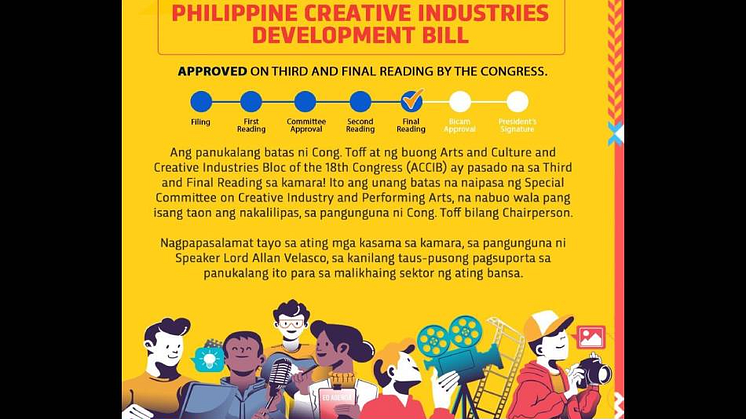
News -
The important role of IP as Philippines aims to become Southeast Asia's top creative economy
In September 2021, the Philippines’ House of Representatives passed a landmark bill known as the Philippine Creative Industries Development Act. It could soon become a law, and its goal is nothing less than to make the country Southeast Asia's top creative economy by 2030.
Already, the Philippines’ creative sector is full of potential. In 2014, with little government support, the creative economy accounted for 7% of the country's’ GDP, and that’s only counting the copyright-based sector. There are currently around 2 to 3 million creative project freelancers for local work, and 1.5 million online freelancers for international work. The latter has even been described as the next wave of outsourcing, with The Ken reporting that the Philippine Creative Industries Development Act hopes to give creatives the same financial incentives that boosted the country's business process outsourcing sector.
These include tax incentives, grants and loans to help creatives realise their projects, as well as support from the Departments of Trade and Industry, Education, and Science and Technology, and the National Commission for Culture and the Arts.
Beyond institutional support, creatives also need to rethink the way they view their intellectual property. For example, as viewing options for visual content shift from cinemas to streaming platforms, consultant Joe Caliro advises film-makers to create IP suited for such platforms. That could mean structuring ideas for long-form binge-watching, and keeping an international market in mind when coming up with concepts.
"Don’t produce films for Filipinos, produce Filipino films for the world. That’s a mind shift that needs to happen,” he says.
And, of course, it is critical to protect your IP. On this front, things are looking optimistic. In 2021, copyright filings with the Intellectual Property Office of the Philippines jumped 122% year-on-year, as the agency stepped up its efforts to promote the importance of IP registration. The agency also made registration fees more affordable for creatives.
While noting that such public education efforts for artists were important, politician Christopher de Venecia (a key mover of the Philippine Creative Industries Development Act) also pointed out that consumer respect for IP was equally important. “Consumers must understand their responsibility not to infringe on anyone’s IP," he said. "I always say that a strong foundation of a strong and vibrant creative economy is a strong and vibrant IP regime.”
PitchMark helps innovators deter idea theft, so that clients get the idea but don’t take it. Visit PitchMark.net and register for free as a PitchMark member today.



